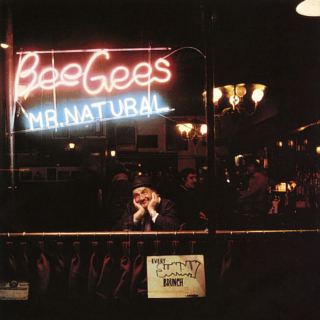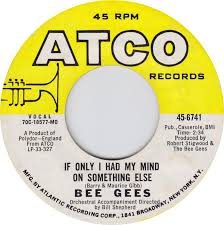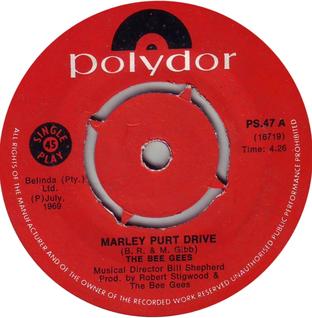Related Research Articles

Cucumber Castle is the seventh studio album by the Bee Gees, released in April 1970. It was produced by Barry Gibb, Maurice Gibb, and Robert Stigwood. It consists of songs from their television special of the same name, which was named after a song on their 1967 album Bee Gees' 1st. Cucumber Castle is the only Bee Gees album not to feature any recorded contributions from Robin Gibb, as he had left the group before the album was recorded.

Trafalgar is a 1971 album by the Bee Gees. It was their ninth album, and was released in September 1971 in the US, and November 1971 in the UK. The album was a moderate hit in the United States, and peaked at No. 34. The lead single "How Can You Mend a Broken Heart?" was the first Bee Gees' No. 1 single in the United States but failed to chart in Britain as did the album. It is Geoff Bridgford's only full-length appearance on a Bee Gees album as an official member.

Mr. Natural is the Bee Gees' twelfth album, released in July 1974. It was the first Bee Gees release to be produced by Arif Mardin, who was partially responsible for launching the group's later major success with the follow-up album Main Course. The album's music incorporates more rhythm and blues, soul and funk and hard rock than their previous albums. The cover photograph was taken at 334 West 4th Street, Greenwich Village, New York City by Frank Moscati.

Now Voyager is the second solo album to be recorded by Barry Gibb, although it was his first to be released. Now Voyager contains his biggest solo hits, "Shine, Shine" and "Fine Line". The album also included the Olivia Newton-John duet "Face to Face", which was released as a promo single. Gibb co-produced the album with Karl Richardson, who had been working with the Bee Gees since 1975. The front cover photograph was taken by Alex Henderson at Victoria Baths, Manchester.

Horizontal is the fourth studio album by the Bee Gees, and their second album to receive an international release. The LP was released in early 1968, and included the international hit singles "Massachusetts" and "World". On 5 February 2007, Reprise Records reissued Horizontal with both stereo and mono mixes on one disc and a bonus disc of unreleased songs, non-album tracks, and alternate takes. The album was released in Polydor in many countries and on Atco only in the US and Canada. "And the Sun Will Shine" was released as a single only in France. The influences displayed on the album range from the Beatles to baroque pop.

To Whom It May Concern is the tenth album by the Bee Gees. Released in October 1972, it was the follow-up, and continued the melancholic and personal sound of its predecessor Trafalgar. The album was recognized as "a farewell to the old Bee Gees" as the album marked the end of an era for the group in several ways: it was their last album to be recorded solely at IBC Studios, in London, their last with conductor and arranger Bill Shepherd who had guided them since 1967, and their last under their first contract with Robert Stigwood. Some of the songs were old ones finished up or rewritten for the occasion. To Whom It May Concern has sold approximately 350,000 copies worldwide.
"Melody Fair" is a song by the Bee Gees, written by Barry, Robin & Maurice Gibb in 1968 and released in 1969 on their album Odessa. It was not released as a single, but this song was played on many radio stations, and was a hit in Japan. Andy Gibb's 1974 group, named Melody Fayre was named after this song. It also featured as the theme to Melody, a British film featuring a number of Bee Gees songs in its soundtrack.

"Mr. Natural" is a song by the Bee Gees, written by Barry and Robin Gibb. On 29 March 1974, it was released as a single and also released on the album of the same name in 1974. It was backed with a folk rock number "It Doesn't Matter Much to Me". The group's first single which was produced by Arif Mardin.

"If Only I Had My Mind on Something Else" is a pop ballad recorded by the Bee Gees. It was written by Barry and Maurice Gibb. It was the first track on the album Cucumber Castle. A remastered version was released in 1990 on Tales from the Brothers Gibb.

"Let There Be Love" is a ballad performed by the Bee Gees, It was written by Barry, Robin and Maurice Gibb and released as the opening track on the 1968 album Idea. It was also issued as a single in the Netherlands in 1970, peaking at number 16. The group performed this song at 192 TV in 1968.

"I'll Kiss Your Memory" is the first solo single written, performed and produced by Barry Gibb, released in May 1970. It peaked at number 16 in the Netherlands. The song was intended for Gibb's unreleased debut album The Kid's No Good.
"Bury Me Down By the River" is a song written by Barry and Maurice Gibb and recorded separately by the Bee Gees and P.P. Arnold. The Bee Gees' version was recorded in May 1969 at IBC Studios and released in April 1970 on the album Cucumber Castle.

"Marley Purt Drive" is a song recorded by the Bee Gees, It was written by Barry, Robin & Maurice Gibb and released in March 1969 on the album Odessa. It was released in stereo in the United States in January and its mono version was released in the United Kingdom in March. The remastered version of this song was released on 27 February 2009 on Reprise Records.

The Kid's No Good was to have been the debut solo album by British musician Barry Gibb following his departure from the Bee Gees, in December 1969. There was no official title given to the album at the time. The line "the kid's no good", which the album is commonly titled on several bootleg releases, is also featured in the Bee Gees song "Come Home Johnny Bridie" on the 1973 album Life in a Tin Can. The album features orchestral arrangements by Bill Shepherd who performed the same role for the Bee Gees from 1965 to 1972.
"Kitty Can" is a song by the Bee Gees, composed by Barry, Robin & Maurice Gibb. It was released as the B-side of "I've Gotta Get a Message to You" in July 1968, and as the second track on the album Idea in September 1968. In 1973, RSO Records released a compilation called Kitty Can only in Argentina and Uruguay, and this song appeared as the first track on that album.
"Sound of Love" is a ballad number performed by the Bee Gees, It was written by Barry, Robin & Maurice Gibb, and appeared on their album Odessa in 1969.

"Lamplight" is a song by the Bee Gees, released as the B-side of "First of May", but featured as the single's A-side in Germany. It also featured on their double album Odessa in March 1969. The song was written and composed by Barry, Robin & Maurice Gibb and featured lead vocals by Robin Gibb. No other singles were released from the album, and the fact that the group's manager Robert Stigwood chose "First of May", which only featured Barry Gibb's voice for the A-side, that caused Robin to quit the group.
"One Bad Thing" is a song written by Barry Gibb in 1969 with Maurice Gibb. Re-recorded by Gibb for his debut solo LP The Kid's No Good. The original copyright of the song was originally credited to Barry and Maurice, but the other versions credited only to Barry alone.
"Birdie Told Me" is a song by the Bee Gees, recorded for the album Horizontal (1967). It was written by Barry, Robin and Maurice Gibb. The song has a duration of 2 minutes and 19 seconds in mono and 2:23 in stereo.

"The Lord" is a song by the Bee Gees. It was released as the B-side of "Don't Forget to Remember" in August 1969 and later included on Cucumber Castle in early 1970.
References
- ↑ "Bee Gees at IBC". IBC Studios. Archived from the original on 24 October 2013. Retrieved 28 May 2013.
- ↑ "Barry Gibb - The Kid's No Good". Discogs. Retrieved 28 May 2013.
- ↑ Brennan, Joseph. "Gibb Songs: 1970" . Retrieved 28 May 2013.